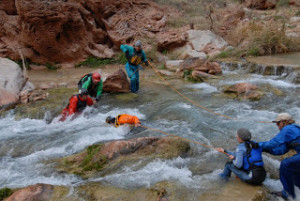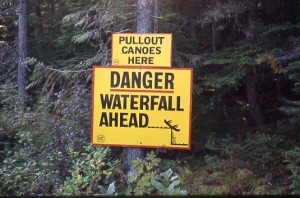There is a consensus among outdoor program commentators that accidents in the outdoors are the result of one or more of unsafe conditions, unsafe acts, and errors in judgment. Leemon et al, “Risk Management for Outdoor Leaders“, 2005, p.16., among others.
(1) UNSAFE CONDITIONS can include one or more of the following:
- falling objects

- swift water
- cold water
- altitude
- falling trees
- illness
- hazardous driving conditions
- unsafe river conditions
- visibility
- wet or slippery terrain
- uneven terrain
- inadequate/insufficient/defective clothing or gear
- inadequate physical condition of participants
- weather (storms, lightning, excessive hot or cold temperatures, floods)
- hazardous animals and plants
(2) UNSAFE ACTS result from one or more of the following:
- inadequate instruction (technical skills/safety procedures)
- unauthorized or improper procedures

- inadequate supervision
- inadequate communication
- inadequate food/drink/medication
- inadequate technical skills
- exceeding ability
- errors in planning
- poor hygiene
- falls or slips
(3) ERRORS IN JUDGMENT result from one or more of the following:
- desire to please others
- adhering to a preset schedule
- overconfidence
- fatigue
- distraction
- miscommunication among participants
- disregarding instincts

- insufficient training/technical skills
- misperception of circumstances (state of individuals or group, impact of weather)
- lack of experience in the relevant situation or environment
- assumptions
- complacency
- inflexibility
- lack of respect for hazards
- peer pressure
How can adult volunteers avoid the above circumstances?
TRAINING! Being current in all applicable BSA training (Safety Afloat, Safe Swim Defense, Trek Safely, Weather Hazards, etc.), not to mention being fully cognizant of the policies and procedures in the Guide to Safe Scouting.
KNOWLEDGE! A significant amount of information is available directed to how to plan and conduct outdoor program activities, apart from that made available by BSA. Adult volunteers should take advantage of this information.
And, finally . . . EXPERIENCE! Adult volunteers should gain as much experience as possible in outdoor program activities.
Complete the TRAINING, obtain the KNOWLEDGE, gain the EXPERIENCE!
Scouts and their parents are counting on you!
